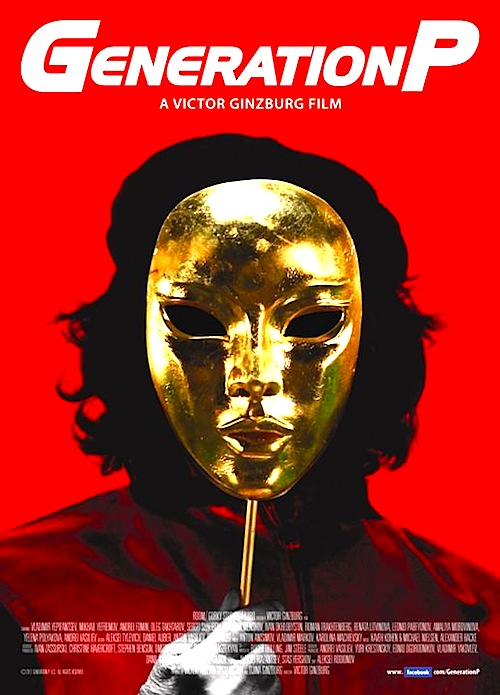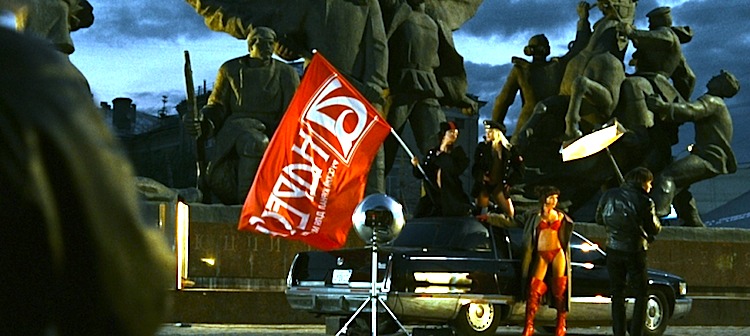By Joe Bendel. Only a bold film would invoke the name “Ishtar,” but Victor Ginzburg is clearly a bold filmmaker. The context is much different here, of course, but Elaine May’s notorious box office dud might have been quite popular in the old USSR, since it co-starred Reds helmer Warren Beatty. As it happens, Soviet era nostalgia plays a significant role in Generation P, Ginzburg’s adaptation of Viktor Pelevin’s Illuminatus!-esque novel of late Yeltsin-era Russia, which screens this week as part of the 2012 New Directors/New Films.
Eventually viewers learn that the Babylonian goddess Ishtar has a special relationship with Russia and its secret history. Though previously oblivious to the byzantine machinations of the behind-the-scenes power players, Babylen Tatarsky has always felt a kinship to all things Mesopotamian because of his name, originally conceived as a hybrid of Yevtushenko’s poem Babi Yar and Lenin. A failed poet working in a kiosk owned by the Chechen mob, Tatarsky falls backwards into a “creative” gig at one of the upstart Russian advertising agencies catering to Russia’s nouveau riche industrial class.
 Tatarsky specializes in calibrating campaigns to appeal to Soviet nostalgia. He does not believe in it himself, though, because he does not believe in anything. That ideological flexibility allows him to advance to larger, more connected firms. However, he has a spiritual advisor in the person of Gireyev, a Buddhist mystic and expert harvester of psychedelic mushrooms.
Tatarsky specializes in calibrating campaigns to appeal to Soviet nostalgia. He does not believe in it himself, though, because he does not believe in anything. That ideological flexibility allows him to advance to larger, more connected firms. However, he has a spiritual advisor in the person of Gireyev, a Buddhist mystic and expert harvester of psychedelic mushrooms.
The “P” in Generation P is an ironic reference to Pepsi, the cola of Glasnost. Though it never outright glamorizes terrorism, P is not that far removed from V for Vendetta, exhibiting similar anarchistic inclinations. However, the closest comparison might be Fear and Loathing in Las Vegas, giving viewers a hallucinogenic tour of Russia worthy of Hunter S. Thompson.
P arguably peaks halfway through. At its most inventive, it mixes Mesopotamian and Soviet imagery to evocatively hint at ancient mystic secrets. However, once Tatarsky reaches the inner circle, the film gets bogged down in rather standard, dog-wagging conspiracy rigmarole.
Beyond its heavy-handed critique of consumerism, it is hard to get a bead on P’s exact ideology. While Tatarsky’s cynical nostalgia campaigns are clearly intended to be problematically simplistic, the only real reference to Russia’s Communist past are the fondly remembered Pioneer Days, which are presented with a Norman Rockwell-like patina of lost innocence. The film also has little love for Yeltsin, but plot developments ironically absolve him of much of his buffoonery. Likewise, there is constant white noise equating all capitalists with oligarchs, but they constantly wind up assassinated for running afoul the mob or the government.
Yet, the similarities between a blunt-talking nationalist “reformer” (literally created on a hard-drive) and the current Russian president – who refuses to relinquish his grip on power – are difficult to miss.

Amidst the maelstrom of satire and metaphysics, Vladimir Epifantsev somehow creates a memorable, multidimensional portrait of Tatarsky, the everyman turned insider. Ginzburg also keeps viewers’ feet solidly on the ground, giving them plenty of narrative handles to guide them through the complicated and surreal storyline. It is a very accomplished work, but it is not clear what it all adds up to, particularly for those coming from what the film somewhat mockingly refers to as a “Soviet mentality.” A strange, sometimes dazzling film certainly worth attempting to decode – but in no way to be considered the final word on the immediate post-Soviet years – Generation P screens this Friday (3/30) at the Walter Reade Theater and Sunday (4/1) at MoMA, as this year’s ND/NF concludes in New York.
Posted on March 28th, 2012 at 5:00pm.